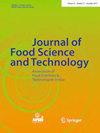间歇式日光干燥对可可豆干燥品质的季节性影响
IF 3.3
3区 农林科学
Q2 FOOD SCIENCE & TECHNOLOGY
引用次数: 0
摘要
在可可豆干燥过程中遇到的气候条件不一致和干燥时间过长可能导致干豆的质量下降,从而导致其市场价值降低。研究了在不同气候条件下,采用混合晒干方式对可可豆干品质的影响。在不同的气候条件下进行干燥:湿季和旱季;测定了混合晒干方式和传统露天晒干方式下可可豆的pH、可滴定酸含量(TA)、游离脂肪酸含量(FFA)等品质特征。结果表明,在一年中不同季节采用混合太阳干燥方式干燥的可可豆,在平均61.5±1.5小时的间歇干燥时间内,均达到安全含水率(7 ~ 8% wb)。此外,干季干燥的可可豆比湿季干燥的可可豆(平均TA为3.3±0.1 meq KOH/g, FFA为0.4±0.01 mg/g)酸性更强(平均TA为3.6±0.1 meq KOH/g, FFA为0.5±0.02 mg/g)。本文章由计算机程序翻译,如有差异,请以英文原文为准。
Evaluation of Intermittent Solar Drying with Seasonal Variation on the Quality of Dried Cocoa Beans
Inconsistency in climatic condition and long drying time encountered during drying of cocoa beans may lead to a loss in the quality of the dried beans and consequently lead to a reduction in its market value. The effects of using a mixed-mode solar drying under varying climatic condition of the year on the quality of dried cocoa beans were investigated. Drying was carried out at different climatic conditions: wet-season and dry-season; and the quality characteristics of the dried cocoa beans such as pH, titratable acid content (TA), and free fatty acid (FFA) content were determined for both mixed-mode solar drying and traditional open-air sun drying. Results showed that all the cocoa beans dried under mixed-mode solar drying at a different season of the year reached a safe moisture content (7 to 8 % w.b.) within an average time of 61.5±1.5 hours of intermittent drying. Additionally, cocoa beans dried during the dry season were more acidic (average TA of 3.3±0.1 meq KOH/g and FFA of 0.4±0.01 mg/g) than those for wet season (average TA of 3.6±0.1 meq KOH/g and FFA of 0.5±0.02 mg/ g).
求助全文
通过发布文献求助,成功后即可免费获取论文全文。
去求助
来源期刊
CiteScore
7.70
自引率
0.00%
发文量
274
审稿时长
11 months
期刊介绍:
The Journal of Food Science and Technology (JFST) is the official publication of the Association of Food Scientists and Technologists of India (AFSTI). This monthly publishes peer-reviewed research papers and reviews in all branches of science, technology, packaging and engineering of foods and food products. Special emphasis is given to fundamental and applied research findings that have potential for enhancing product quality, extend shelf life of fresh and processed food products and improve process efficiency. Critical reviews on new perspectives in food handling and processing, innovative and emerging technologies and trends and future research in food products and food industry byproducts are also welcome. The journal also publishes book reviews relevant to all aspects of food science, technology and engineering.

 求助内容:
求助内容: 应助结果提醒方式:
应助结果提醒方式:


